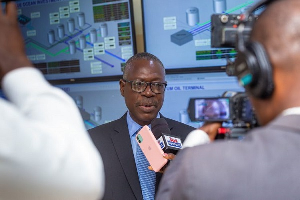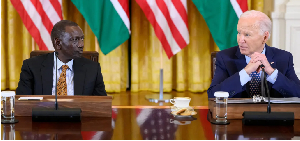- Home - News
- TWI News | TV
- Polls
- Year In Review
- News Archive
- Crime & Punishment
- Politics
- Regional
- Editorial
- Health
- Ghanaians Abroad
- Tabloid
- Africa
- Religion
- Election 2020
- Coronavirus
- News Videos | TV
- Photo Archives
- News Headlines
- Press Release
General News of Wednesday, 20 August 2003
Source: GNA
I have a story to tell - former Chief Whip
Accra, Aug. 19, GNA - Mr Alexander Yaw Adjei, Deputy Government Chief Whip during the Limann Administration, on Tuesday urged the National Reconciliation Commission (NRC) to invite Flt Lt Jerry Rawlings, former Chairman of the erstwhile Provisional National Defence Council (PNDC), to clear his name after projecting him (Adjei) as a bad person in the eyes of the public.
Mr Adjei, alias Fort Alexander, who was also MP of Asamankese, referred to a report in the Daily Graphic newspaper of July 26 1982, in which Flt Lt Rawlings was reported to have reaffirmed the innocence of the PNDC in the killing of three High Court judges and a retired army officer.
He said Flt Lt Rawlings was reported as having said that the PNDC never had had a hand in the murder of the four since it had released Nana Okutwer Bekoe and him, both high ranking politicians of the then People's National Party administration from detention.
Mr Adjei said the mentioning of his name and that of Nana Bekoe, by Flt Lt Rawlings was "premeditated murder" and urged the Commission to invite the former President to explain why he mentioned his name, before he could forgive him.
Mr Adjei recalled that at a Party get-together before Parliament went on recess in July 1981, he advised late President Limann to be careful of the security situation in the country else "we might not return to Parliament after the recess," implying a possible military coup.
The former Deputy Chief Whip said he was arrested in February 1982 while fleeing to Lome after the December 31, 1981 Revolution, adding, the soldiers seized his briefcase containing a gold watch, 1,000 US dollars, 500 British pounds, 350 Swiss Francs and 100,000 old 50 cedi notes.
Mr Adjei said after his arrest he was sent to the Gondar Barracks operational room where he said he met Flt Lt Rawlings in the presence of one Captain Kojo Tsikata and Riad Hoziafeh and some soldiers.
He said the soldiers used him "for a punching bag" and gave him more than 20 slaps when he said, "Rawlings and his men" should be surcharged for pulling down the Makola Market.
The witness said he was later sent to the horse-room where Sgt Alolga Akata Pore and some soldiers used his ear as an ashtray and deposited the embers of the cigarette they were smoking. They only stopped when one Commander Okwabi asked them not to do so, he said.
Mr Adjei said Sgt Akata Pore also threatened to slaughter him like a cow and later sent him to the Gondar Barracks Guardroom, which had no roof and both men and women, numbering about hundred were put together and shared the same toilet facilities.
While in the Guardroom, Lance Corporal Halidu Giwa and one Dawutey used iron rods a number of times to hit him on the head, which oozed blood and he was rushed to the 37 Military Hospital for treatment, adding that, he was brought back and made to carry a bag of cement on the stitches.
He said one Sgt Agorha slapped him from behind. The bag got burst and his body was covered with cement powder.
Mr Adjei said he spent one month in the guardroom where he also met a number of political detainees including Nana Okutwer Bekoe, Mr Kwaku Baah, former Vice President De-Graft Johnson and Mr Agyekum, who later became Chairman of a public tribunal, as well as some armed robbers and criminals.
Mr Adjei said he was transferred to the Cantonments Police Station and then to the Ussher Fort Prison, adding that, he spent three years in detention.
Mr Adjei said he was transferred to the Akuse Police Station, during a trial at a tribunal chaired by Mr Addo Aikins.
He was charged with unlawful possession of foreign currency, but the soldiers who arrested him failed to produce the money as evidence, and he was discharged.
The Powers that be at the Castle refused to abide by the decision of the tribunal and he was thrown back into jail and released on August 31, 1985.
He said while in detention at the Gondar Barracks, soldiers went to his house at the Airport Residential Area, beat his wife and children and seized his four cars, three of them brand new. General Arnold Qauinoo, a PNDC member, later used the Honda Prelude, he said and added that the soldiers used the Peugeot 504 car for operational duties.
The soldiers again attacked his house, issued threats to his wife and children.
When they left to take refuge in the wife's father's house, the People's Defence Committee (PDC) took over from the soldiers and ransacked all his household effects, including a television set and a sound system.
He said a soldier used the sitting room of his house at Asamakese as a kitchen.
Mr Adjei said when he was about to be released, he was taken to the PDC Headquarters and forced to write and sign a document that he would not take legal action against the PDC, with a threatening caution that he would be sent back to jail if he refused to write and sign the document. The former Deputy Majority Chief Whip said he, Sgt Akata Pore and Braimah Kankani were later incarcerated together at the Ussher Fort Prison, adding that, Akata Pore later wept and apologised for manhandling him.
Mr Adjei said, "vengeance belongs to God," and "the Lord's Vengeance had already taken place".
He said, "a lot of the people who subjected me to the brutalities are dead, but I am alive".
The Chairman of the Commission, Justice Kweku Amua-Sekyi, suggested to Mr Adjei to seek legal advice if the document he was made to write at the PDC Headquarters could still be enforced
Mr Gerald Kofi Yaotse, a pensioner of the then Electricity Corporation of Ghana, who was led into the witness seat.
Although he directly faced the Commissioners, he often turned to the direction of the speakers to determine the direction of the sound before answering questions.
Mr Yaotse said he was declared 99 per cent blind after he was arrested and detained for three years without charge.
He said he was arrested, in September 1961, three days after two of his workplace colleagues quarrelled over a bronze statue of the then President, Dr Kwame Nkrumah.
The witness said while in detention, he was exposed to strong light, given poor diet and later underwent stomach operation. He pleaded to be resettled. 19 Aug 03










